Lara, who lives in Southern Mount Lebanon, purchased one and a half barrels of diesel last summer and stored it until winter, as heating oil prices were low at that time. However, as this stockpile nears depletion, she will resort to other options to get through the winter at a lower cost. Heating methods in Lebanon have become accessible only to the wealthy due to electricity cuts and rising fuel prices. This winter, the Lebanese are burdened with finding "heating solutions" as fuel prices soar, hitting record highs not seen in Lebanon's history.
Lebanese authorities lifted fuel subsidies last year, with a barrel of diesel now costing nearly 800,000 Lebanese pounds (about 17 dollars at market exchange rates), while a gas cylinder is around 500,000 Lebanese pounds (11 dollars). The price of a ton of firewood has risen to around 120 dollars, noting that any mountain home needs between 5 to 10 tons of firewood during winter. According to researcher Mohammed Shams Al-Din from "International Information," the average heating cost for the season (100 days) is approximately 80 million Lebanese pounds for diesel and 60 million for firewood. He adds, "Given that this figure is very high for poor families and low-income earners, cheaper alternatives must be sought."
Some alternatives include the remains of olives after oil extraction, called "olive pomace," as it is "free and easy to obtain," according to Shams Al-Din. He pointed out that those who used to rely on diesel have switched to firewood as its price has significantly increased (according to the black market dollar price). This explains the increased number of fires during summer due to tree cutting for firewood. Those who cannot afford the cost of firewood and diesel resort to olive oil mills to obtain "olive pomace" as an alternative for heating, which is plentiful this year due to a good olive and oil season.
The higher the elevation above sea level, the more significant the struggle and need for heating. In this context, Lara is considering her options after running out of the diesel she stored in the summer. She tells "Asharq Al-Awsat": "If we cannot afford to buy more diesel, we might rely on gas, depending on our financial situation," noting that gas and coal prices "remain slightly better than diesel." She adds that all options will lead her to reduce heating, as "we will only use heating methods at night and minimize them as much as possible during the day."
Unlike mountainous areas, heating in Beirut often relies on woolen blankets and thick clothing, and when the cold intensifies, Rania resorts to an "electric heater" if a generator is available or switches to a "gas heater" or coal, as she explained in her conversation with "Asharq Al-Awsat."
In the absence of electricity, reliance on "electric heaters" is limited to those who can afford to pay the subscription fees for private generators. As for gas, Shams Al-Din says it might meet the need for some due to its rising prices as well, but it "may be feasible in Beirut but is not suitable for the cold of mountainous areas."
This reality becomes increasingly difficult for residents near Beirut, like Samah, who lives in the Shuweifat area and cannot bear the cost of diesel. She tells "Asharq Al-Awsat": "It is clear that we will not be able to afford gas either after its price has soared wildly, and the only means for now are clothes and wool blankets."
The heating crisis also affects the availability of hot water. Sarah tells "Asharq Al-Awsat" that "in the absence of electricity, we used a diesel water heater, which has now become impossible due to the high costs associated with private generators, so we have replaced the diesel and electricity heater with a wood heater, which is very suitable for the severe cold in the mountains." She indicated that a wood stove has become one of the cheaper heating methods, significantly reducing the use of gas; firewood can be used for cooking, heating water for coffee and tea, and even lighting charcoal for shisha. Most mountain homes have replaced diesel with wood stoves, and some use kerosene, but it is no longer widely available.




